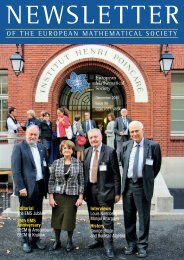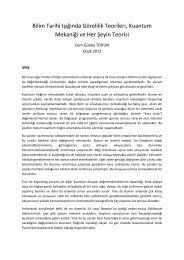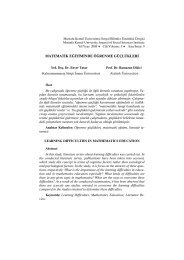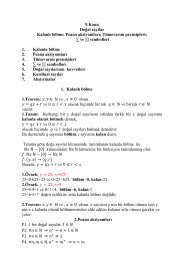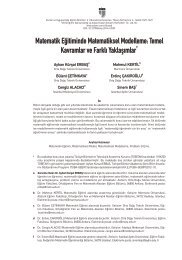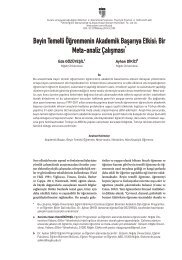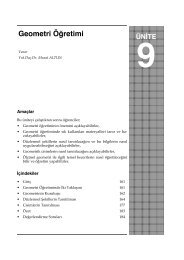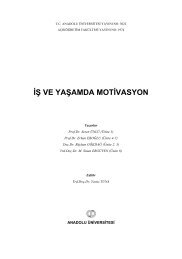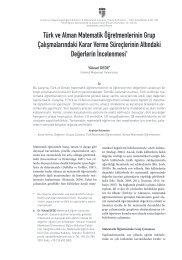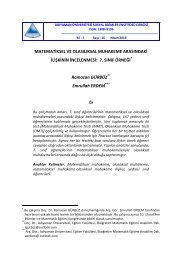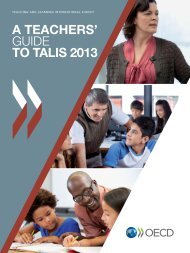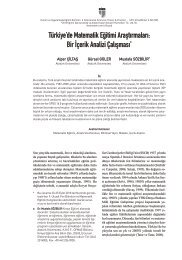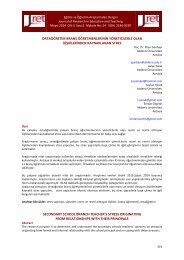wider variety of strategies with a higher frequency rate than bilingual individuals (Nayak etal, 1990) which is also the case in the present study. The present study showed thatmultilinguals practise out language learning strategies remarkably more often than bilingualindividuals; particularly direct strategies and memory strategies for which significance wasfound. Researchers have investigated several reasons for the difference in language learningstrategies and have linked the difference to the mutlinguals’ language processing systembeing different due to the acquisition of an additional language (Cenoz, 2003; Cenoz &Genesee, 1998; Herdina & Jessner, 2002). Moreover, differences in language awareness(Herdina & Jessner, 2002), ability to reach to two linguistic systems (Joaristi et al., 2009) anddifference in the amount of language learning experience (Cenoz, 2003) have been purposedas other reasons. According to Nayak et al. (1990) who conducted a study in which theyanalyzed the strategies that multilingual subjects used the reason for multilinguals’ frequentuse of strategies is their “greater flexibility in switching strategies” (p. 242).Apart from the analysis of the all the construct of the SILL, the present study alsoinvestigated each of the constructs which lead to the conclusion that bilingual andmultilingual individuals significantly differ in the use of direct strategies, which deal with thenew language acquired, memory strategies, which are used for remembering and retrievingnew information and a marginal significant effect of cognitive strategies, which are used forunderstanding and producing the language. Although the study of Sung (2011) in whichChinese language learners’ strategies were investigated pointed out that learners who acquiredtwo or more languages use metacognitive, social, affective and cognitive strategies morefrequently, the current study did not find a statistical difference in these strategies and itscategory (indirect strategies). It is important to highlight that the reason for the significantdifference in direct strategies can be based on the amount and experience of language learningwhich gives an advance to multilingual individuals. Similar interpretations can be made forthe use of memory strategies by stating that bilingual language learners pose less languageawareness and awareness of the importance of memorizing in language learning.As for the main effect of cognitive strategies, it is thought that the differences inlanguage knowledge, processing and awareness lead to the assumption that these differencesfoster cognitive advantages for multilinguals which assist them to be better language learners(Cenoz & Jessner, 2000; Cook, 2003; Herdina & Jessner, 2002). Therefore, these differencesmay be the reason for the difference in cognitive strategies.68
In the present study the effect of instructors knowing the native language of theirstudents on the language learning strategies was also analyzed. Oxford (1990) stated thatteachers have a fundamental effect on the emotional atmosphere in the classroom and that theteacher is the one who teaches learners to use affective strategies. The findings suggest thatthere was a main effect of the instructor’s native language on the affective strategies.Furthermore, a significant difference has been found in the affective strategies between thebilinguals who were taught by Turkish and Spanish instructors; in other words, those bilingualparticipants who shared the same native language as their instructors employed significantlyless than those bilingual participants who were taught by non-native instructors. This impactmay be due to bilinguals’ low amount of language experience as affective strategies includeencouragement to speak when being afraid to make mistakes and giving reward to oneselfwhen being well. Due to the low amount of experience, bilinguals may feel nervous andunmotivated while using the target language. However, the present study shows that bilinguallearners taught by the instructors who are not competent in the learners’ native languageencourage and reward themselves more often than learners with an instructor able to speak thelearners’ native language. This difference might be the result of the obligation to use thetarget language and consequently overcoming the fear of making mistake or beingmisunderstood. Learners with instructors, with whom they can communicate in the nativelanguage, do not feel the need to use the target language as they are always understood evenin their native language. Thus, their stress while using the language will not be overcome andthe level of fear will not decrease.5. Implications and LimitationsAlthough the study reached its aims, there were some limitations. Firstly, this studywas carried out in a single language institution which led to a low level of generalizability;therefore, future studies should be conducted in different institutions in Turkey andworldwide to analyze the consistency between the studies and reach to more reliable findings.The limited number of participants is another limitation of the present study. Includinga larger number of participants to the study may be considered by future studies on languagelearning strategies.Considering the effect of the number of languages known on the language learningstrategies, it is fundamental to be aware and to consider that the amount of language learningexperience has an influential impact on the process of language learning. Additionally, the69
- Page 1 and 2:
ISSN: 2146-7676UFUK ÜNİVERSİTES
- Page 3 and 4:
UFUK ÜNİVERSİTESİSOSYAL BİLİM
- Page 5 and 6:
SUNUŞDergimizin 2014 yılı ilk sa
- Page 7 and 8:
A NEED-BASED EVALUATIONOF A PREPARA
- Page 9 and 10:
In the literature on language teach
- Page 11 and 12:
focus teaching on this. Accordingly
- Page 13:
International Relations) were 20 (7
- Page 16 and 17:
questionnaire in their English-medi
- Page 18 and 19: REFERENCESAlagözlü, N. K. (1984).
- Page 20 and 21: APPENDIX A1 STUDENT QUESTIONNAIRE
- Page 23 and 24: 24. Converting short notes into
- Page 27 and 28: The Role Of Gender On University St
- Page 29 and 30: (Johnson 2001; Türküm, 2005). Joh
- Page 31 and 32: Table 1 : Means and Standard Deviat
- Page 33 and 34: 2.3 ProcedureEthical permission to
- Page 35 and 36: age and attitude toward help seekin
- Page 37 and 38: Economics and Administrative Scienc
- Page 39 and 40: REFERENCESAddis, M. E., & Mahalik,
- Page 41 and 42: Koydemir-Özden, S. (2010). Self-as
- Page 43 and 44: LİSE ÖĞRENCİLERİNİN MESLEKİ
- Page 45 and 46: göre mesleki bakımdan daha önce
- Page 47 and 48: Araştırmanın amacıMesleki olgun
- Page 49 and 50: Tablo 1: Lise Öğrencilerinin Mesl
- Page 51 and 52: Lise öğrencilerinin karar verme s
- Page 53 and 54: KAYNAKÇA Acıbozlar, Ö. (2006). Y
- Page 55: Oğuz, Ö. (2008). Lise öğrencile
- Page 58 and 59: 1. IntroductionDifferent from the p
- Page 60 and 61: noteworthy to mention that multilin
- Page 62 and 63: The findings indicate that multilin
- Page 64 and 65: Table 1. Descriptives statistics fo
- Page 66 and 67: overall six factor structure which
- Page 70 and 71: inclusion of instructors who are no
- Page 72 and 73: Gardner, R. C., & MacIntyre, P. D.
- Page 74 and 75: AppendicesAppendix A- English Profi
- Page 77 and 78: ELT Student Teachers’ Evaluations
- Page 79 and 80: Reflective Teaching in TurkeyIn Tur
- Page 81 and 82: Table 1: Reliability Analysis o
- Page 83 and 84: Table 4: Mean and standard dev
- Page 85 and 86: Table 9: Mean and standard dev
- Page 87 and 88: ReferencesAkbari, R. (2007). Reflec
- Page 89: Pollard, A. & Triggs, P. (1997) Ref
- Page 92 and 93: 1. GİRİŞEğitim ve program geli
- Page 94 and 95: Genelgeçer tek bir bilimsel sürec
- Page 96 and 97: Program geliştirmedeki yenilikleri
- Page 98 and 99: -Elde ettiği sonuçlardan hareket
- Page 100 and 101: “İnternet Üzerinden Öğrenme
- Page 102 and 103: de sınıf içi dersler de öğrenm
- Page 104 and 105: teknik ve pedagojik uzmanlar gerekt
- Page 106 and 107: 3. Proje ekibinin kurulması4. Plan
- Page 108 and 109: KAYNAKÇABigdoli, H. (2004). The In
- Page 110 and 111: 110
- Page 112 and 113: Hiçbir öğrenci bir diğeriyle ay
- Page 114 and 115: İçerik sınıfta nelerin öğreti
- Page 116 and 117: (MEB, 2006; Tomlinson, 2005). Ek ol
- Page 118 and 119:
- Öğrencilerden gereksinim duyduk
- Page 120 and 121:
desteklerine gereksinim duydukları
- Page 122 and 123:
KAYNAKÇAAlberto P. A, ve Troutman
- Page 124 and 125:
124
- Page 126 and 127:
1.GİRİŞBuradaki araştırma OECD
- Page 128 and 129:
öğretilenleri almışlar mı diye
- Page 130 and 131:
edileceğini araştırmaz, ancak bu
- Page 132 and 133:
yaşarlar: Çok fazla sayıda koşu
- Page 134 and 135:
• Birincil Stratejiler ve Destek
- Page 136 and 137:
ir dönemdir. Özellikle artan yaş
- Page 138 and 139:
2. Hipotez: Öğretmenlerin coğraf
- Page 140 and 141:
Tablo 7 Öğretmenlerin Coğrafi
- Page 142 and 143:
stratejileri”ne yönelik bilişse
- Page 144 and 145:
sonuçları χ 2 (12, N =407) = 13,
- Page 146 and 147:
sebebiyet verir. Bunun önemli bir
- Page 148 and 149:
KAYNAKÇAArtelt, C., Stanat, P., Sc
- Page 150 and 151:
Lieteratur. 10. Sonderheft: Lesesoz
- Page 152 and 153:
YAYIM ALANI, YAZIM KURALLARI ve YAZ
- Page 154:
• Birebir alımlar “…” İş




